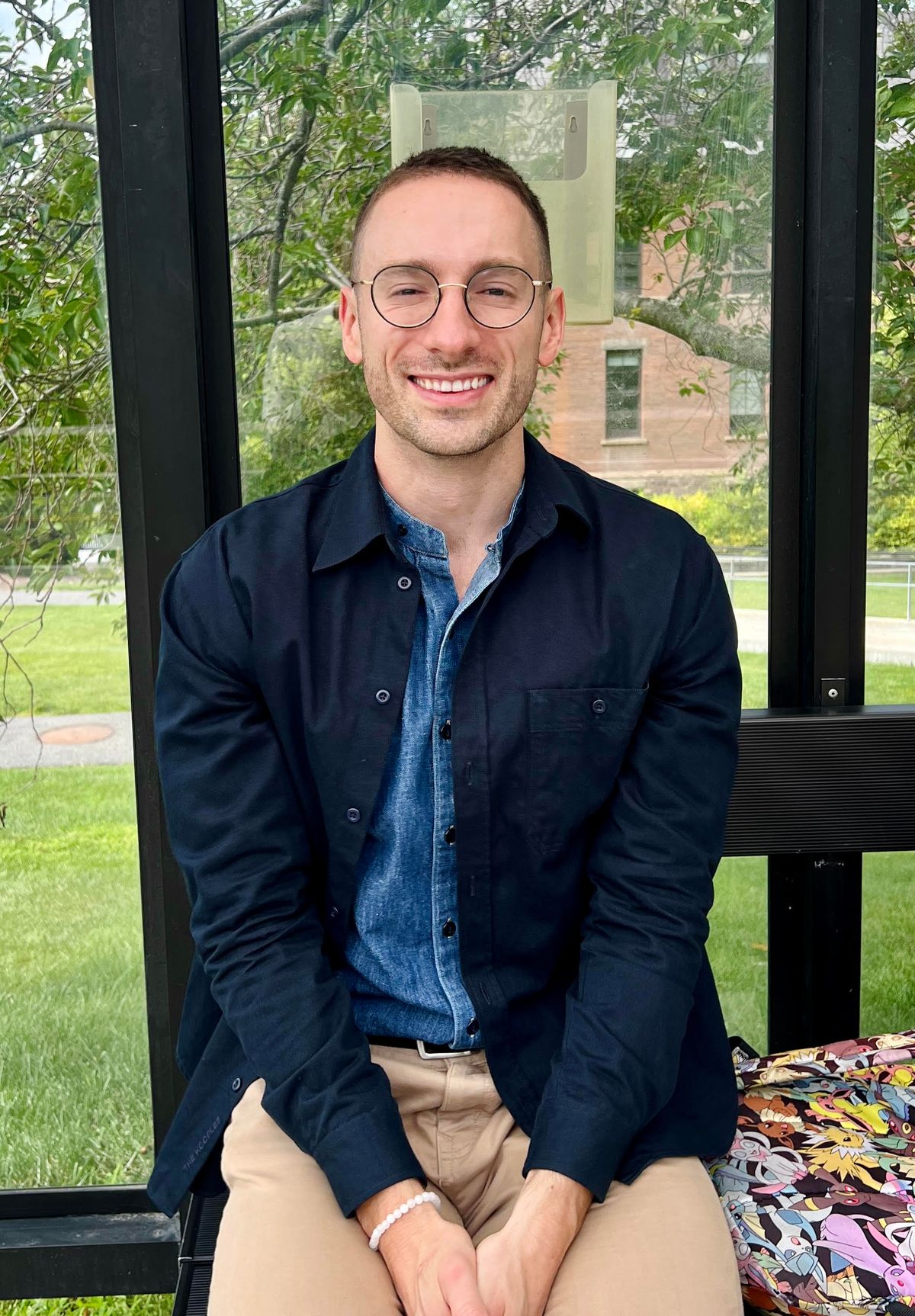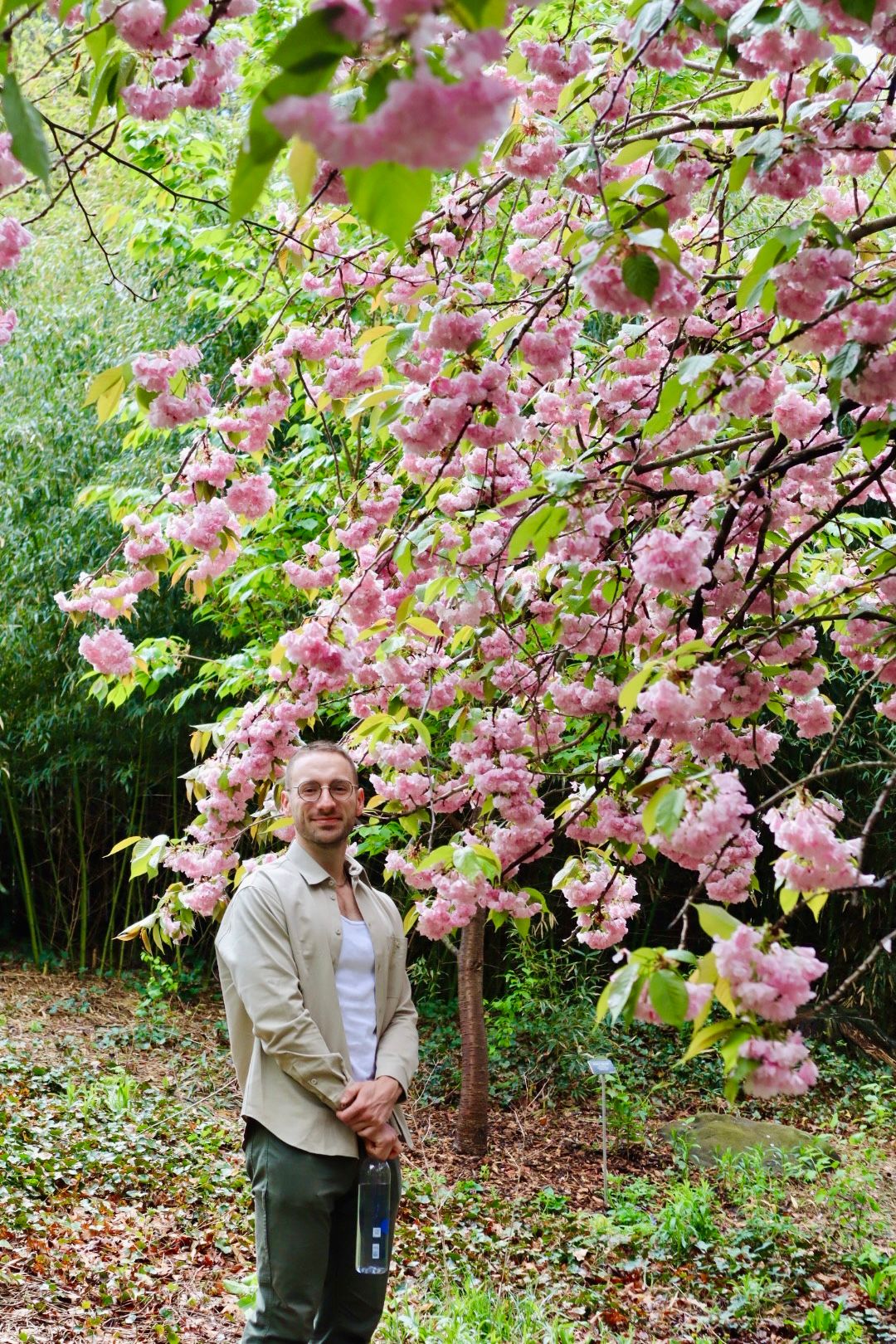Fresh Faculty: Matthew Westermayer
Matthew Westermayer is a visiting assistant professor of religion and a scholar deeply interested in the arboreal and nonhuman world, also known as “the tree guy.” He recently completed his doctorate in Near Eastern Studies at Cornell, and is teaching “Ecology and Religion” and “Jesus” this fall.

My conversation with Matthew Westermayer, visiting assistant professor of religion, happened amid a busy period of travel and faculty orientation. He had just defended his doctoral dissertation at Cornell a few weeks before — “it was a mad sprint to the deadline” — then moved from New York City with his cat, Harper.
Given that Westermayer is a scholar of Christianity in late antiquity in the Near East, you might be surprised to know that we spent most of our time talking about trees. “Trees are having their own moment,” he told me. “Everyone I talk to is so interested in the trees, and they’re not so much interested in Christianity. But you know, trees are kind of a great equalizer: Doesn't matter if you’re Jewish, Buddhist, Christian, everyone deeply cares about the tree.”
His interest in trees is a relatively recent development, though. Religion was what first hooked him. “As with any subject,” he reflects, “I think you are compelled to it by some force of necessity. And that is very true for me.”
In high school, Westermayer had what he thought at the time to be a religious experience. “[I] would go on to deconstruct that later in life and ask, ‘What was really going on there?’” he recalled. Nonetheless, it was a “pivotal moment.” He went from not having considered college to studying religion at Baylor University.
After completing his bachelor’s degree, he came out, which “created a lot of tension with communities that I was part of.” He had no plans in particular but knew he wanted to further his education, so he applied to Princeton Theological Seminary as a way to “buy a little more time” to think about his life. (He added that he would never advise a student to do this.)
At Princeton, he took a class with a prominent New Testament historian, who also happened to be “fresh faculty” that year. Watching him lecture, Westermayer felt awed: “There was just such a command of thousands of years of history. I thought: I need to do this. This is my life’s calling.”
For Westermayer, to study history is to find out “just how much is underneath the surface of anything you hold dear or believe.” He began learning the languages of the original texts: Greek, Syriac, Coptic. Then, he did a master’s at Yale on the history of Christianity to get “exceptionally trained in all things history and language.”
It wasn’t until he went to Cornell for his doctorate, while living in Ithaca’s “interesting physical environment,” that he became “the tree guy.” In his first semester, he wrote a paper about Egyptian Christian crosses that had faces and could speak. While doing his research, he came across a graffito at a monastery, next to where monks and visitors would use the cross to spell their names on the wall. It was a tree with a human head and branches of human fingers. It wasn’t exactly relevant for his project at the time, so he “filed it away.”
The summer after his first year, he had a moment to reflect. “I sat down and thought: At the end of the day, what kind of dissertation would I be happy to write?” He decided, “Regardless of what would happen with the jobs — and everyone knows, the Ph.D. job market is one of the worst — I would be eternally happy if I had written a book on that tree.”
Since then, he said, “I’ve just been consumed by trees.”

Westermayer noted that many people believe western religions, particularly Christianity, are only interested in the metaphysical, and are to blame for our current disconnection from the natural world. “But those ideas are being overturned,” says Westermayer. His own research is uncovering a history of “rigorous intellectual engagement and practices with trees and plants, flowers and place” within Christianity.
For example, his dissertation looked at tactile ways of encountering trees — like grafting, harvesting, or chopping them down — and the way they shape both the tree and the person doing the act. “So I ask, ‘Why?’ And it's because of this powerful, dynamic link between people, trees, and practices.” To illustrate, he cited two famous moments in Christianity when people took fruit from a tree: Adam and Eve in the garden, and Augustine of Hippo, whose theft of a pear prompted him to narrate his Confessions and question the origin of evil. “And I’m saying that’s just what happens when you take fruit from a tree!”
This fall, his course “Ecology and Religion” looks beyond Christianity and western religion to examine why there is a “unique place for the arboreal … in every culture and every history.” In this moment of unparalleled climate crisis and a reevaluation of our relationship with animals and the nonhuman world, Westermayer believes that looking to our histories and traditions is a way of marshaling every resource — to complicate our thinking, “give back some form of alterity to these non-human subjects,” and slow us down. “I will have considered it a successful course if people look at trees, or goats, or cows, and maybe all of a sudden stutter, or have some sort of hesitation about how to think or act or relate to these things.”
As for the study of Christianity, Westermayer thinks it is “kind of an invitation into the study of everything.” That is because, “to understand it as a phenomenon, you have to think about everything from how to bury the dead, to how to relate to a tree, or … Can women read the Bible? Can they preach? — And they did in antiquity, but it made some men angry. Or … How do you make books? And who reads those books? It's sort of this fractal pattern … it just keeps repeating itself, on and on.” In this way, “whatever you’re interested in as a student, you can bring to bear on this topic.”
He acknowledges that Christianity is a subject which “evokes a lot of reaction” and comes with many assumptions. One of these assumptions, according to Westermayer, is that there is a small, standard set of texts with which to understand the origins of the whole movement. But when you read outside the canon, as students do in his other course this fall, titled “Jesus,” “you’ll get a sense of just how contested and complex the origins and the development of this movement was.”
In his free time, Westermayer surprisingly does not enjoy hiking or the outdoors, though he looks forward to lying in his hammock “for an obscenely long amount of time” during “that moment in October, when the weather is just right.”
He is a lover of poetry and thinks that “everyone should have a different taste” in it, though he highlighted Constantine Cavafy’s “Ithaka” in particular, as it made him weep. When I asked him for more books to read as an undergraduate, he, without “want[ing] to sound pretentious,” recommended Marcel Proust’s “In Search of Lost Time”: “Volume one, and maybe two, then you figure out from there if you want to go to the whole seven.” (He’s on volume four.)
Another is Jacque Derrida’s “Monolingualism of the Other” and its insights on leaving space between yourself and another. Here, we circled back to trees: “Of course, [trees] don’t speak. So anytime that I try to think about them and understand them, I have to leave space. I can’t just walk away confident and assured, because I have to understand that there is an act of translation between us.”
In the coming year, Westermayer is excited for the little things, like enjoying the beauty around Amherst (“the pictures don’t do it justice”), celebrating eight years with his partner, as well as getting to know his students and “seeing what they’re going to teach me. And they definitely will.”





Comments ()